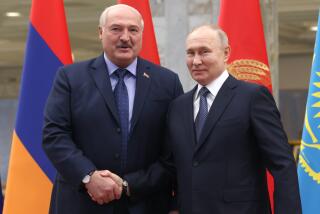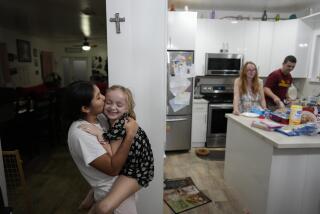A Country of Troubled Orphan Warehouses
TOMILINO, Russia — Americans adopted 5-year-old Alisa Magomedova, a very bright and very angry little girl. At her orphanage outside Moscow, workers are happy for Alisa. Some shake their heads.
“I can only admire American parents who adopt Russian children,” says Tamara Plotkina, chief pediatrician at the Tomilino Orphanage. “But I think sometimes they are naive. These children’s problems are insurmountable.”
About 230,000 children are housed in the state orphanage system. Many--some observers say most--are physically and mentally stunted, their growth arrested by previous abuse, neglect and malnutrition.
At Tomilino, another 5-year-old recently arrived infected with syphilis. A preschooler came covered with cigarette burns. Out of 30 children, 29 had alcoholic parents.
Russian orphanages clean up such children and feed them. “But that’s not enough to erase the damage,” says Antonina Salob, deputy director at Tomilino.
In 1999, the latest year for which figures are available, foreigners adopted 6,200 Russian children, including more than 4,348 who went to U.S. homes, officials said.
Russians themselves adopted 7,000 children. Many families cannot afford to take in extra children, says Vladimir Borovik, head of the department for orphanages at the Education Ministry.
Russia is trying to reform its adoption system, to rid it of corruption and alleged bribery and baby-selling by independent adoption agents. Most people welcome the stricter regulations, despite the delays and complications they mean for foreign adoptions.
Even though the new rules will improve Russian adoption procedures, they do nothing to improve conditions in the country’s underfunded, understaffed orphanages.
Tomilino workers say they are dedicated, but tired. They deny accusations from some angry adoptive parents that orphans are abused and neglected. They are simply stretched too thin, caregivers say.
Vera Panosh has been in and out of orphanages and shelters for most of her 15 years. Beneath a shock of black hair are piercing brown eyes. Tomilino, she says, is better than most institutions: “Here they let you bathe alone.”
In most places, children wash in groups. But even at Tomilino, hot water is a luxury.
So is red meat. And fresh vegetables. Porridge and stringy chicken are standard fare. The orphanage cannot afford a full-time cook.
Common areas smell of disinfectant. Immune systems are weak, and bedrooms are shared by up to 12 children. Sheets are often torn and blankets too thin.
Many children are wan and listless. Others fidget, quickly becoming bored with broken toys piled in a chilly corner. Most are smaller and thinner than other children their age.
At Tomilino, one adult oversees about 10 children and earns $24 a month. The official average wage is $90 per month.
“If she were to change them every time they urinate, she would be changing a child 360 times a day,” says Galina Krasnitskaya, a pediatric expert at the Institute for Russian Childhood. “That would be lifting 12 tons per shift. So of course they lift the children less, change them less, and the children get less emotional warmth.”
Alisa, though bright and more energetic than most at Tomilino, has an unpredictable temper, Salob says. Sometimes when playing peacefully with other children, she would suddenly lash out, yelling and scratching at people who came near. Then she sulked.
Workers attributed the girl’s volatility to living through war--her parents were killed in Chechnya.
Her new American parents were told everything the orphanage knew about Alisa, which wasn’t much, Salob says. The girl was left at Tomilino by a relative who gave little family history.
Alisa departed with her new parents in early December. Orphanage officials said Russian laws prohibit releasing any information about her American family.
More to Read
Sign up for Essential California
The most important California stories and recommendations in your inbox every morning.
You may occasionally receive promotional content from the Los Angeles Times.










